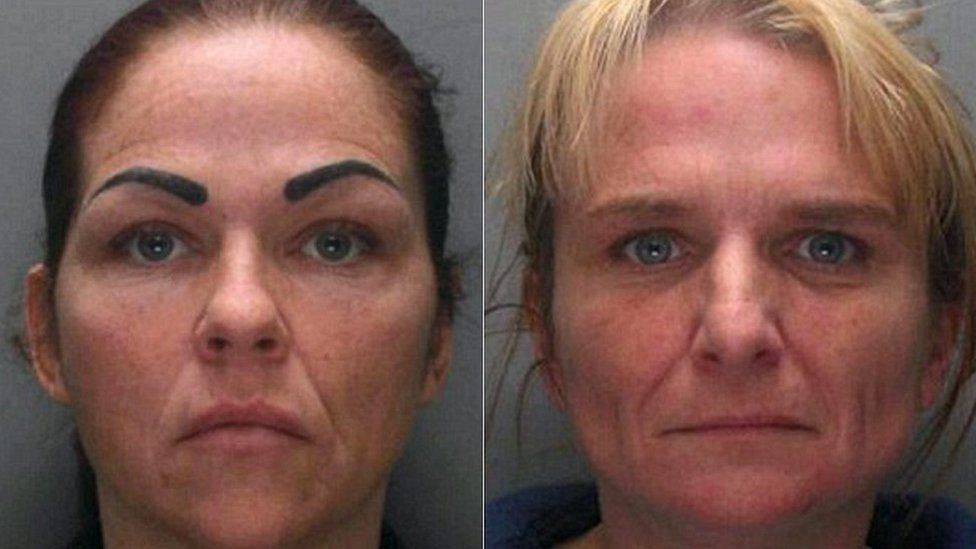Dad hopes joint enterprise law change could help jailed sisters
- Published

Two sisters have spent the last 11 years in prison as convicted murderers - despite not being physically responsible or even present at the crime scene. Now their father is hoping a proposed change in the law could eventually free them.
Maureen and Kelly Smith, along with three men, were found guilty of murdering Maureen's former partner David Corridon, who was stabbed six times during a raid on his home in the Norris Green area of Liverpool in 2012.
They were convicted under the law of joint enterprise, which allows for an accused person to be convicted even if they did not inflict the fatal blow.
For the case to be proven against them, the prosecution must only satisfy jurors the accused had foreseen the possibility of a crime being committed.
Seven years ago the Supreme Court said the law had taken a "wrong turn" and been misinterpreted for 30 years.
Kevin Smith is convinced his daughters suffered as a result and hopes a proposed change to the law could help overturn their conviction.
However, Mr Corridon's family said they were in "no doubt the joint enterprise law was correctly interpreted and the sentences given accurately reflected the actions of all the defendants".
For the last 10 years Mr Smith has looked after all four of his grandchildren while their mothers remain behind bars.
He thinks the current law of joint enterprise is being too loosely interpreted by the criminal justice system so that it is easier to secure convictions.
The Smith sisters' trial heard they had arranged for a gang to steal thousands of pounds from Mr Corridon's house in February 2012.
But the theft turned to murder when the 32-year-old was found to be at home.
Maureen and Kelly Smith were sentenced to 23 and 22 years respectively.
Mr Smith said his daughters had never intended for anyone to get hurt, and had asked for the raid to happen when nobody was at home.
"I'm not saying they should walk away scot-free, because they were the catalyst who started it all in the first place," said Mr Smith.
The Crown Prosecution Service said if a person assists or encourages another to commit a murder, with intent to kill or cause serious bodily harm, it is right they can face prosecution for their involvement in the crime.
Crucially, however, prosecutors must ultimately prove to a jury beyond reasonable doubt that each defendant is guilty.
The Jimmy McGovern drama Common highlighted the issue of joint enterprise and inspired Liverpool Riverside MP Kim Johnson to use a private members' bill to reform the law.
She presented the Joint Enterprise (Significant Contribution) Bill to the Commons in December.
Ms Johnson said: "I became aware of joint enterprise after watching Jimmy McGovern's shocking and powerful drama Common in 2014.
"It's not about being soft on law. It is about putting right an injustice.
"This is simply about strengthening and using the law correctly, so those who do commit a crime are convicted and serve a sentence but those who don't play a significant role do not serve a life sentence."
Her Private Members Bill would amend the 1861 Accessories and Abettors Act "to provide that criminal liability only applies to a person who directly commits, or who makes a significant contribution to, a crime".
However, her bill would need the government to allocate more parliamentary time for it to reach the statute book.
'Accurate sentences'
In a statement, Mr Corridon's family said they were "shocked, appalled and devastated" by the actions of those responsible for the death of the "devoted father, big brother and son" who they described as "mild mannered and sincere".
They said: "The actions of those responsible for commissioning the burglary and the murder of David have left us with a life sentence and no amount of amount of time can heal the loss and pain we have been left to deal with.
"We attended court every day of the trial and witnessed first-hand was a complete lack of remorse and common decency from the defendants and some of their family members. Not only did these people murder David, but they also went all out during the trial to assassinate his character."
The family added: "Having heard all the evidence put before the court we are in no doubt the joint enterprise law was correctly interpreted and the sentences given accurately reflected the actions of all the defendants."
In 2018 the sisters lost an appeal - with judges ruling there was nothing wrong with their convictions. Their father hopes any change to the law could help their case.
"It's destroyed the family," said Mr Smith, adding his wife "died of a broken heart".
"She couldn't take it," he said.
Ms Johnson's bill will get its second reading on 2 February.
A statement from the Ministry of Justice said: "The government recognises the importance of the law on joint enterprise and the consequences it has for defendants and their families, as well as on victims and their loved ones.
"We have no current plans to amend the law in this area but will consider carefully the text of Kim Johnson's bill when published."
Related Topics
- Published7 December 2023
- Published18 February 2016
- Published10 January 2013